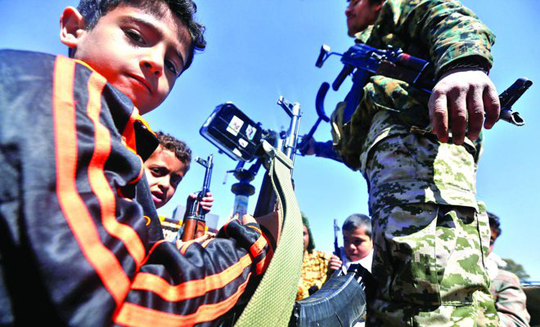Cairo, Jan 4: A report alleging human rights violations in Yemen by Houthi rebels has recorded 949 cases of damaged public property and 2,673 instances of private property damage, the Saudi Embassy here reported on Tuesday.

The damage varied between complete and partial by bombardment from Houthi militants and loyalists of deposed President Abdullah Saleh against civilian homes and government and private facilities, according to a statement released on Tuesday by the embassy.
The statement also said that Houthi rebels attacked and looted facilities. They also occupied some civilian buildings to be used as military barracks.
The report recorded 3,027 cases in which Houthi militias and Saleh loyalists allegedly undermined the powers of the state — which included financial, administrative imbalances, intervention in the tasks, issuance of appointments outside the framework of law, exclusion of some civil servants from their jobs and their positions, creating private prisons and checkpoints — and other acts of looting and tampering with public money during the first half of 2016.
The statement said the Houthis and Saleh militias are using heavy weapons against populated areas. As a result, more than 1,529 people were killed, including 102 women and 221 children in the governorate of Taiz.
Saudi Arabia and coalition forces are keen to use targeted, sophisticated and high-cost smart weapons to avoid civilian loss of life.
Saudi Foreign Minister Adel Al-Jubeir said on Sept. 7 during a speech at Chatham House Institute: “There is a lot of criticism to our (military) operations in Yemen, but the matter that is not understood by many people is that we run it with the utmost care and caution.”
He pointed out: “We have a highly professional air force and high-precision weapons. We try as much as possible to avoid causing any civilian casualties, and when accidents occur or questions arise, we do the necessary investigation and then work on changing the mechanisms we follow in order to avoid repetition. But the same criticisms do not address the Houthis and Saleh rebels who recruit children aged 9, 10, 11 and 12. They indiscriminately shell towns and villages, imposing blockades on them. They are starving people and stealing the humanitarian aid to use it as a bargaining tool in order to make political progress.”
He added: “We are working under Article 51 of the Charter of the United Nations Security Council Resolution (2216), which condemned the Houthis for their role in the seizure of the government and calls on them to withdraw from the territories they occupied and requires them to hand over their weapons. But they flagrantly violated all these demands, and yes I do not see any criticism to them.”
The embassy’s statement stressed that the achievements of “Restoring Hope” and “Decisive Storm” operations could not be ignored. The coalition has succeeded in liberating more than 80 percent of the land of Yemen and handed it over to the legitimate government.
The “Decisive Storm” managed to destroy the Houthi air force and more than 95 percent of ballistic missiles captured by the militias, in addition to destroying 98 percent of tanks and armored vehicles seized by them.
The Arab coalition has also secured the international shipping lines across Bab Al-Mandab Strait, which led to the elimination of alleged Iranian influence in Yemen and the end of the threat posed by the Houthi militias against the Kingdom.





Comments
Add new comment